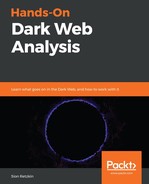Since the operations leading to the closing of Dark Web markets, and the ensuing trials, are a matter of public record, many hundreds of people think of new ways to work and create new markets that are harder to bring down.
It's also important to remember that many of these markets sell legitimate goods or services, where the illegal part is usually a lack of taxation on the sale of goods, or a lack of documentation as vendors, and other bureaucratic reasons. Take Dr.X as an example—he provides medical advice, testing of recreational drugs, and support for recreational drug users. There are many countries in the world where this is a legal and positive service.
You can even find vegetables, electronics, and a multitude of other goods that are quite legal to buy and sell.
The original goal of Dark Web markets was to provide free marketplaces, without censorship, where prices are fair and there's no middle man between the vendor/seller and the buyer; where the market or the vendor doesn't collect information about us.
Many regular market sites advocate information gathering to help with personalizing the products offered to us.
Personally, I greatly prefer to search by myself, and not receive offers or have product advertisements sent to me, but nowadays marketing works like that.
The Dark Web markets of the future (and of today, actually) won't collect information about us, unless we allow it. That's just how the Dark Web works.
Think about it: you access a market site, search for what you want, without receiving suggestions or offers, based on your previous purchases, since the market doesn't collect anything about you. I know that I would like that.
Until recently, Dark Web markets came and went. Usually, they were closed by law enforcement, while other times hackers brought them down.
For example, Agora, one of the top markets in 2015, was shut down, due to attempts to crack their security defenses (it is unknown if they shut down themselves or were forced to shut down)
Other markets, such as Hansa and Silk Road Reloaded, expanded their trading onto I2P channels, where they compete with more traditional marketplaces., such as OpenBazaar, a Bitcoin-based market that offers an inventory of goods and services on the Surface Web. Their framework allows for trading directly with customers, using the Invisible Internet Project (I2P) network, multisig addresses (multisig addresses require multiple keys to authorize a Bitcoin transaction, which allows for dividing up possession of bitcoins), and digital signatures to provide secure communication directly between the buyer and seller.
This is what was displayed on the Hansa site, after it was closed:

In May 2017, OpenBazaar incorporated a Tor mode option that allows users to become a relay, as part of a Tor network. This will effectively obscure and protect their identity, making OpenBazaar a form of a Dark net site. Since the creators of OpenBazaar view their market as an anonymous one, it is possible for sales of illegal goods to happen, but if this has or will happen, only time will tell.
Anonymous marketplace-based trading will expand and become mainstream in the future. Many questions exist, such as how to resolve differences between anonymous entities (buyer and seller), how to prevent scamming, and more.
How they will be resolved remains to be seen.
The following screenshot shows the homepage of OpenBazaar:

The following screenshot displays FAQs from the OpenBazaar site, explaining its concept:

A proposed solution for these Dark Web markets is decentralization. It can help with issues of market operator trust. It provides peer-to-peer sites, written in open source code (more secure), high level of encryption, and privacy.
Centralization is an issue on the Surface Web. Huge companies control large portions of the internet real estate. Take Google, Amazon, and Microsoft, for example. Can we really trust them with our privacy? Let's hope so.
Blockchain behavior should also be implemented into these marketplaces in the future.
One instance where decentralization was tried was Pirate Bay. In 2014, they planned to implement a decentralized version of their site, which would use the resources of the user's machine (buyer or seller). This would ensure continuity of the site, and continue, as long as users accessed it.
This didn't happen in the end, but the idea was sound, and can be implemented in the future.
ZeroNet:

ZeroNet has created a peer-to-peer system, preventing censorship and hosting costs, without a single point of failure.
ZeroNet removes IP addresses and assigns cryptographic keys to websites, similar to a cryptocurrency wallet address. The public key is the site address, and the private key gives the key holder the ability to create and maintain the site. Users provide the sites to each other, as peers.
The following screenshot of what ZeroNet say about itself is taken from its website:

ZeroBazaar is an example of a new project, a combination of ZeroNet and OpenBazaar, utilizing the best of both technologies, and providing a truly free and private online market.
